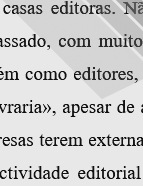

................................
Although Luís de Montalvor's Ática (1891-1947) adopted a more literary slant (it was the first to systematically publish Fernando Pessoa), it should be noted for the publication of two highly important historiographical works, but with very different orientations: the História do Regime Republicano em Portugal [History of the Republican Regime in Portugal](1930-1932, two volumes), organised by Luís de Montalvor himself (and which was the basis for the creation of the publishing house), and the História da Expansão Portuguesa [History of Portuguese Expansion] (1937-1940, three volumes), directed by António Baião, Hernâni Cidade and Manuel Múrias. Despite the founder's death, Ática continues to operate. (A. Anselmo, Idem, 2015, pp. 163-166.)
Edições Cosmos' "Biblioteca Cosmos" ["Cosmos Library"], by Manuel Rodrigues de Oliveira (1911-1996), left an indelible legacy, perhaps more the collection than the publishing house itself. Firstly, for its success: between 1941 and 1948, it launched 114 titles, totalling 793,500 copies, with an average of 6960 copies per title; secondly, for the political and cultural project on which it was founded; thirdly for the significant number of Portuguese intellectuals it published (only 19 books were translated), who were almost always figures who opposed the regime; and finally for its director, Bento de Jesus Caraça (1901-1948), a maths professor who was a leading figure in the cultural and political life of the time. Despite assuming itself as a continuation of the Biblioteca do Povo e das Escolas, the collection was not limited to informative works, but rather embodied a cultural project that involved the large-scale dissemination of scientific knowledge. Bento de Jesus Caraça adopted a very active role in managing the collection, not only by selecting and rejecting works, but also by commissioning texts and requesting extensive reviews of the works submitted, with the aim of maintaining a high level of editorial coherence. (N. Medeiros, Idem, 2010, pp. 150-158.)
The collection was divided into seven sections: "Sciences and techniques" (48), "Arts and letters" (20), "Philosophy and religion" (3), "Peoples and civilisation" (6), "Biographies" (5), "Human epics" (1) and "Problems of our time" (23). As may be observed, Bento de Jesus Caraça's main interest was the dissemination of science, which occupied almost half of the catalogue. Nevertheless, history was also present with, for example, Armando Castro, Introdução ao Estudo da Economia Portuguesa (Fim do século XVIII a Princípios do século XX) [Introduction to the Study of the Portuguese Economy (Late 18th century to Early 20th century); Flausino Torres (Civilizações Primitivas, Religiões Primitivas [Primitive Civilizations, Primitive Religions]), José de Freitas (A China Antiga e Moderna [Ancient and Modern China]), and Condorcet's landmark work, "Sketch for a Historical Picture of the Progress of the Human Mind" (with an introduction by Vitorino Magalhães Godinho), and L. Adam (Primitive Art). (J. Neves, “A Biblioteca Cosmos”, 2006.).
